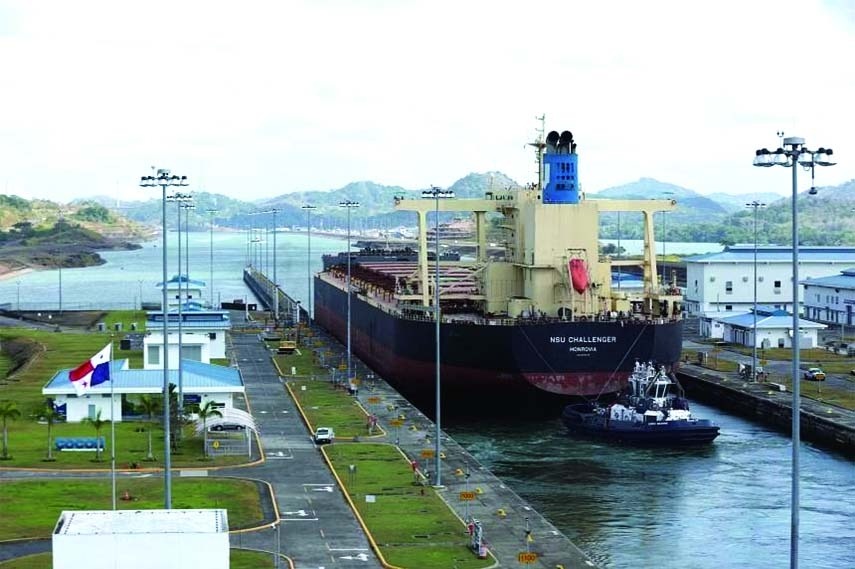Historic drought, hot seas slow Panama Canal shipping

Before the Ever Max ship carrying lava lamps, sofas, Halloween costumes and artificial Christmas trees could make its inaugural Panama Canal voyage this month, a historic drought forced it to drop weight by offloading hundreds of containers.
Weather-related disruptions denied the vessel, owned by Taiwanese shipping company Evergreen Marine, a chance on Aug 1 to set a record for carrying the most containers through the vital maritime shortcut that connects the Pacific and Atlantic oceans, Reuters reports.
The Panama Canal Authority has reduced maximum ship weights and daily ship crossings in a bid to conserve water. Maritime transport experts fear such eventsRead More : Cruise company still looking for port for virus ship could become the new normal as rainfall deficits in the world's fifth-wettest country spotlight climate risks affecting the ocean shipping industry that moves 80 per cent of global trade.
Shipowners have the options of carrying less cargo, shifting to alternate routes that can add thousands of kilometres to the trip or grappling with queues that earlier in August backed up 160 vessels and delayed some ships by as much as 21 days.
The restrictions are already sending China-US spot shipping prices up as much as 36 per cent amid soaring sea temperatures that climate scientists warn could supercharge extreme weather.
"You have to wave a caution flag because the temperatures are so far above normal," said Mr Drew Lerner, founder and senior agriculture meteorologist at World Weather, whose customers include global commodity traders.
Canal operators are on a tightrope as they work to manage maritime trade disruption and prepare for what is shaping up to be an even drier period in 2024, said Mr Peter Sand, chief analyst at air and ocean freight rate benchmarking platform Xeneta.
More than 14,000 ships crossed the canal in 2022. Container ships are the most common users of the Panama Canal and transport more than 40 per cent of consumer goods traded between North-east Asia and the US East Coast.
US-bound vessels caught in the bottlenecks have carried Barbie dolls, auto parts, BYD solar panels, water treatment equipment, diabetes testing kits and other goods, according to data from Mr Steve Ferreira, chief executive of a company that audits ocean shipping bills.
Restrictions at the canal started earlier in 2023, affecting about 170 countries and virtually every type of goods - including soya beans and liquefied natural gas (LNG) from the United States, copper and fresh cherries from Chile, and beef from Brazil.
Bulk carriers that transport commodities from corn to iron ore, and tankers that move oil, fuel, gas and chemicals also are affected. Some energy companies are rerouting vessels laden with coal and LNG to the Suez Canal.
Weather-related disruptions denied the vessel, owned by Taiwanese shipping company Evergreen Marine, a chance on Aug 1 to set a record for carrying the most containers through the vital maritime shortcut that connects the Pacific and Atlantic oceans, Reuters reports.
The Panama Canal Authority has reduced maximum ship weights and daily ship crossings in a bid to conserve water. Maritime transport experts fear such events
Shipowners have the options of carrying less cargo, shifting to alternate routes that can add thousands of kilometres to the trip or grappling with queues that earlier in August backed up 160 vessels and delayed some ships by as much as 21 days.
The restrictions are already sending China-US spot shipping prices up as much as 36 per cent amid soaring sea temperatures that climate scientists warn could supercharge extreme weather.
"You have to wave a caution flag because the temperatures are so far above normal," said Mr Drew Lerner, founder and senior agriculture meteorologist at World Weather, whose customers include global commodity traders.
Canal operators are on a tightrope as they work to manage maritime trade disruption and prepare for what is shaping up to be an even drier period in 2024, said Mr Peter Sand, chief analyst at air and ocean freight rate benchmarking platform Xeneta.
More than 14,000 ships crossed the canal in 2022. Container ships are the most common users of the Panama Canal and transport more than 40 per cent of consumer goods traded between North-east Asia and the US East Coast.
US-bound vessels caught in the bottlenecks have carried Barbie dolls, auto parts, BYD solar panels, water treatment equipment, diabetes testing kits and other goods, according to data from Mr Steve Ferreira, chief executive of a company that audits ocean shipping bills.
Restrictions at the canal started earlier in 2023, affecting about 170 countries and virtually every type of goods - including soya beans and liquefied natural gas (LNG) from the United States, copper and fresh cherries from Chile, and beef from Brazil.
Bulk carriers that transport commodities from corn to iron ore, and tankers that move oil, fuel, gas and chemicals also are affected. Some energy companies are rerouting vessels laden with coal and LNG to the Suez Canal.
Source: dailyasianage.com
